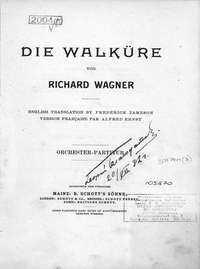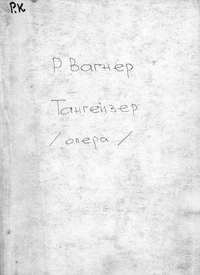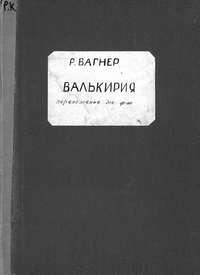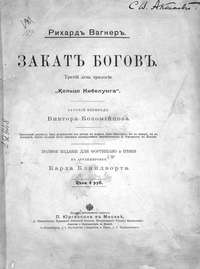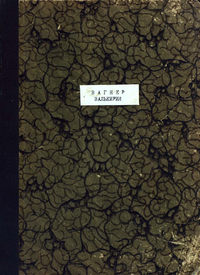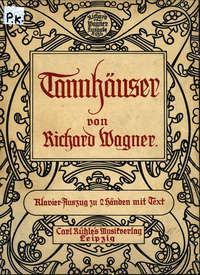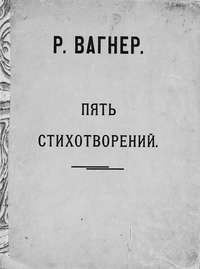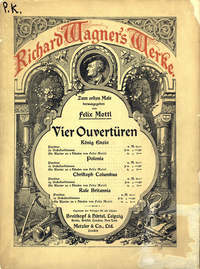 полная версия
полная версияMy Life. Volume 2
'Der Vogel der heut' sang, Dem war der Schnabel hold gewachsen; Ward auch den Meistern dabei bang, Gar wohl gefiel er doch Hans Sachsen.' [Footnote: 'The bird who sang this morn From Nature's self had learned his singing; Masters that song may scorn, For aye Hans Sachs will hear it singing.' (Translation of the Meistersinger, by Frederick Jameson.)—Editor.]
In Mayence I got to know the Schott family, with whom I had only had a casual acquaintance in Paris, more intimately. The young musician Weisheimer, who was just then beginning his career as musical director at the local theatre, was a daily visitor at their house. At one of our dinners another young man, Stadl, a lawyer, proposed a remarkable toast in my honour in a most eloquent and astonishing speech. Notwithstanding all this I had to recognise that in Franz Schott I was dealing with a very singular man, and our negotiations proceeded with extraordinary difficulty. I insisted emphatically on carrying out my first proposal, namely, that he should provide me for two successive years with funds necessary for the undisturbed execution of my work. He excused his unwillingness to do this by pretending it was painful to his feelings to drive a bargain with a man like myself by purchasing my work for a certain sum of money, including also the profits of my author's rights in the theatrical performances; that, in a word, he was a music publisher, and did not want to be anything else. I represented to him that he need only advance me the necessary amount in proper form, and that I would guarantee him the repayment of that proportion of it which might be considered due payment for the literary property, out of my future theatrical takings, which would thus be his security.
After a long time he agreed to make advances on 'musical compositions still to be delivered,' and to this suggestion I gladly acceded, insisting, however, that I must be able to depend on a total gradual payment of twenty thousand francs. As, after settling my Vienna hotel bill, I was in immediate want of money, Schott gave me a draft on Paris. From that city I now received a letter from Princess Metternich, which mystified me, inasmuch as it merely announced the sudden death of her mother, Countess Sandor, and the consequent change in her family circumstances. Once more I deliberated whether it would not be better, after all, to take at random a modest lodging in or near Karlsruhe, which in time might develop into a peaceful and permanent dwelling. Owing to my difficulty in providing Minna's allowance, which according to our agreement was three thousand marks a year, it struck me as more reasonable and certainly more economical to ask my wife to share my home. But a letter which just then reached me from her, and the main contents of which were nothing less than an attempt to incite me against my own friends, scared me away from any thought of reunion with her, and determined me to adhere to my Paris plans and keep as far away from her as possible.
So towards the middle of December I started for Paris, where I alighted at the dingy-looking Hotel Voltaire, situated on the quay of the same name, and took a very modest room with a pleasant outlook. Here I wished to remain unrecognised (preparing myself meanwhile for my work) until I could present myself to Princess Metternich at the beginning of the new year, according to her wish. In order not to embarrass the Metternich's friends, Pourtales and Hatzfeld, I pretended that I was not in Paris, and looked up only those of my old acquaintances who did not know these gentlemen, such as Truinet, Gasperini, Flaxland, and the painter Czermak. I met Truinet and his father regularly at supper time in the Taverne Anglaise, to which I used to make my way unobserved through the streets at dusk. One day, on opening one of the papers there I read the news of the death of Count Pourtales. My grief was great, and I felt particularly sorry that, out of my singular regard for the Metternichs, I had neglected to visit this man who had been a real friend to me. I at once called on Count Hatzfeld, who confirmed the sad news and told me the circumstances of the sudden death, which was the result of heart disease, the existence of which the doctor had not discovered till the very last moment. At the same time I learned the true significance of the events which had taken place at the Hotel Metternich. The death of Countess Sandor, of which Princess Pauline had informed me, had produced the following developments: the Count, who was the famous Hungarian madman, had up to that time, in the general interest of the family, been strictly guarded by his wife as an invalid. At her death the family lived in fear of the most terrible disturbances from her husband, now no longer under control, and the Metternichs therefore thought it necessary to take him at once to Paris, and keep him there under proper supervision. For that purpose the Princess found that the only suitable suite of apartments at her command was the one previously offered to me. I at once saw it was useless to think any more of taking up my residence at the Austrian embassy, and I was left to reflect on the strange freak of fortune that had again cast me adrift in this ill-omened Paris.
At first the only course open to me was to stay in my inexpensive lodging in the Hotel Voltaire until I had finished the libretto of the Meistersinger, and meanwhile set to work to find the refuge so earnestly sought for the completion of my new work. It was not an easy matter; my name and person, which everybody involuntarily regarded in the doubtful light of my Paris failure, seemed surrounded by a cloud of mist, which made me unrecognisable even to my old friends. The Olliviers also appeared to receive me with an air of distrust; at any rate, they thought it very strange to see me again so soon in Paris. I was obliged to explain the extraordinary circumstances that had brought me back, and told them that I did not contemplate a long stay. Apart from this probably deceptive impression, I soon noticed the great change that had taken place in the home life of the family. The grandmother was laid up with a broken leg, which at her age was incurable. Ollivier had taken her into his very small flat for more efficient nursing and care, and we all met for dinner at her bedside in the tiny room. Blandine had greatly changed since the previous summer, and wore a sad and serious expression, and I fancied that she was enceinte. Emile, although dry and superficial, was the only one who gave me any sound advice. When the fellow Lindau sent me a letter through his lawyer demanding the compensation awarded him by the law for his imaginary co-operation in the translation of Tannhauser, all that Emile said on reading the letter was, 'Ne repondez pas,' and his advice proved as useful as it was easy to follow, for I never heard anything more of the matter. I sorrowfully made up my mind not to trouble Ollivier any more, and it was with an inexpressibly sad look that Blandine and I parted.
With Czermak, on the other hand, I entered into almost daily intercourse. I used to join him and the Truinet family of an evening at the Taverne Angiaise, or some other equally cheap restaurants which we hunted out. Afterwards we generally went to one of the smaller theatres, which, owing to pressure of work, I had not troubled about on my former visits. The best of them all was the Gymnase, where all the pieces were good and played by an excellent company. Of these pieces a particularly tender and touching one-act play called Je dine chez ma Mere remains in my memory. In the Theatre du Palais Royal, where things were not now so refined as formerly, and also in the Theatre Dejazet, I recognised the prototypes of all the jokes with which, in spite of poor elaboration and unsuitable localisation, the German public is being entertained all the year round. Besides this I occasionally dined with the Flaxland family, who still refused to despair of my eventual success with the Parisians. For the present my Paris publisher continued to issue the Fliegender Hollander as well as Rienzi, for which he paid me tifleen hundred francs as a small fee, which I had not bargained for on the first edition.
The cause of the almost cheerful complacency with which I managed to regard my adverse situation in Paris, and which enabled me afterwards to look back on it as a pleasant memory, was that my libretto of the Meistersinger daily increased its swelling volume of rhyme. How could I help being filled with facetious thoughts, when on raising my eyes from the paper, after meditating upon the quaint verses and sayings of my Nuremberg Meistersinger, I gazed from the third-floor window of my hotel on the tremendous crowds passing along the quays and over the numerous bridges, and enjoyed a prospect embracing the Tuileries, the Louvre, and even the Hotel de Ville!
I had already got far on into the first act when the momentous New Year's Day of 1862 arrived, and I paid my long-delayed visit to Princess Metternich. I found her very naturally embarrassed, but I quite cheerfully accepted her assurances of regret at being obliged to withdraw her invitation owing to circumstances with which I was already acquainted, and I did my utmost to reassure her. I also begged Count Hatzfeld to inform me when Countess Pourtales would feel equal to receiving me.
Thus through the whole month of January I continued working on the Meistersinger libretto, and completed it in exactly thirty days. The melody for the fragment of Sachs's poem on the Reformation, with which I make my characters in the last act greet their beloved master, occurred to me on the way to the Taverne Anglaise, whilst strolling through the galleries of the Palais Royal. There I found Truinet already waiting for me, and asked him to give me a scrap of paper and a pencil to jot down my melody, which I quietly hummed over to him at the time. I usually accompanied him and his father along the boulevards to his flat in the Faubourg St. Honore, and on that evening he could do nothing but exclaim, 'Mais, quelle gaite d'esprit, cher maitre!'
The nearer my work approached its termination, the more earnestly had I to think about a place of abode. I still imagined that something similar to what I had lost by Liszt's abandonment of the Altenburg was in store for me. I now remembered that in the previous year I had received a most pressing invitation from Mme. Street, to pay her and her father a long visit in Brussels; on the strength of which I wrote to the lady and asked if she could put me up for a time without any ceremony. She was en desolation at being obliged to deny my wish. I next turned to Cosima, who was in Berlin, with a similar request, at which she seemed to be quite alarmed, but I quite understood the reason of this when, on visiting Berlin later on, I saw the style of Bulow's quarters. It struck me as very strange, on the other hand, that my brother-in-law Avenarius, who, I heard, was very comfortably settled in Berlin, begged me most earnestly to go to him, and judge for myself whether I could not pay him a long visit. My sister Cecilia, however, forbade me to take Minna there, although she thought she could find her a lodging in the immediate neighbourhood if she wanted to visit Berlin. Unfortunately for herself, poor Minna could find nothing better to do than to write me a furious letter about my sister's cruel behaviour to her, so the possibility of a renewal of our old squabbles deterred me at once from accepting my brother-in-law's proposal. At last I bethought me of looking out for a quiet retreat in the neighbourhood of Mayence, under the financial protection of Schott. He had spoken to me about a pretty estate there belonging to the young Baron von Hornstein. I thought I was conferring an honour upon the latter when I wrote to him at Munich asking permission to take up my abode for a time at his place in the Rhine district, and was therefore greatly perplexed when I received an answer expressing terror at my suggestion. I now determined to go at once to Mayence, and ordered all our furniture and household goods, which had been stored in Paris for nearly a year, to be sent there. Before leaving Paris, after coming to this decision, I had the consolation of receiving a sublime exhortation to face everything with resignation. I had previously informed Frau Wesendonck of my situation and the chief source of my trouble, though of course only as one writes to a sympathetic friend; she answered by sending me a small letter-weight of cast-iron which she had bought for me in Venice. It represented the lion of San Marco with his paw on the book, and was intended to admonish me to imitate this lion in all things. On the other hand, Countess Pourtales granted me the privilege of another visit to her house. In spite of her mourning, this lady did not wish to leave her sincere interest in me unexpressed on account of her sad bereavement; and when I told her what I was then doing, she asked to see my libretto. On my assuring her that in her present frame of mind she could not enter into the lively character of my Meistersinger, she kindly expressed a great wish to hear me read it, and invited me to spend an evening with her. She was the first person to whom I had the opportunity of reading my now completed work, and it made such a lively impression upon us both, that we were many times compelled to burst out into fits of hearty laughter.
On the evening of my departure on the first of February, I invited my friends Gasperini, Czermak, and the Truinets to a farewell meal in my hotel. All were in capital spirits, and my good-humour enhanced the general cheerfulness, although no one quite understood what connection it could have with the subject on which I had just completed a libretto, and from the performance of which I anticipated so much.
In my anxiety to choose a suitable residence, which was now so necessary to me, I directed my steps once more to Karlsruhe. I was again received in the kindest manner by the Grand Duke and Duchess, who inquired about my future plans. It turned out, however, that the residence I so earnestly desired could not be provided for me in Karlsruhe. I was much struck by the sympathetic concern of the Grand Duke as to how I could meet the cost of my arduous life, or even my travelling expenses. I cheerfully endeavoured to set his mind at rest by telling him of the contract I had made with Schott, who had bound himself to provide me with the necessary funds in the form of advances on my Meistersinger. This seemed to reassure him. Later on I heard from Alwine Frommann that the Grand Duke had once said that I had been somewhat cold towards him, considering that he had been kind enough to place his purse at my disposal. But I was certainly not conscious of his having done so. The only point raised in our discussion had been whether I should go to Karlsruhe again to rehearse one of my operas there, possibly Lohengrin, and conduct it in person.
At any rate I started for Mayence, which I reached on the 4th February, and found the whole place flooded. Owing to the early breaking up of the ice, the Rhine had overflowed its banks to an unusual extent, and I only reached Schott's house at some considerable risk. Nevertheless, I had already arranged to read the Meistersinger on the evening of the 5th of that month, and had even made Cornelius promise to come from Vienna, and had sent him a hundred francs from Paris for that purpose. I had not received any answer from him, and as I now learned that the floods had spread to all the river districts of Germany, and impeded the railway traffic, I had already ceased to count upon him. I waited until the last moment and—in fact, just as the clock struck seven—Cornelius appeared. He had met with all sorts of adventures, had even lost his overcoat on the way, and reached his sister's house in a half-frozen condition only a few hours before. The reading of my libretto put us all into excellent humour, but I was very sorry I could not shake Cornelius's determination to start on his return journey the next day. He wished me to understand that his sole object in coming to Mayence was for this one reading of the Meistersinger, and as a matter of fact, in spite of floods and floating ice, he left for Vienna on the following day.
As we had already arranged, I began in company with Schott to search for a residence on the opposite bank of the Rhine. We had had Biebrich in our mind's eye; but as nothing suitable seemed to present itself there, we thought of Wiesbaden. At last I decided to stay at the 'Europaischer Hof' at Biebrich, and continue my search from there. As I had always been most particular to keep aloof as far as possible from the noise of music, I decided to rent a small but very suitable flat in a large summer residence newly built by the architect Frickhofer, and situated close to the Rhine. I was obliged to await the arrival of my furniture and household effects from Paris before I could get it in order. At last they came, and at endless trouble and expense were duly unloaded at the Biebrich custom-house, where I took possession only of those things which I required most.
I kept only what was absolutely necessary in Biebrich, intending to send the greater part to my wife in Dresden. I had already informed Minna of this, whereupon she immediately assumed that with my clumsy unpacking I should lose half the things or ruin them all. About a week after I had fairly settled down with my newly arrived Erard grand, Minna suddenly appeared in Biebrich. At first I felt nothing but sincere pleasure at her healthy appearance and untiring energy in the practical management of affairs, and even thought the best thing I could do was to let her remain with me. Unfortunately my good resolutions did not last long, as the old scenes were soon renewed. When we went to the custom-house, intending to separate her things from mine, she could not contain her anger that I had not waited for her arrival before removing on my own account the articles I required for myself. Nevertheless, she thought it only proper that I should be provided with certain household effects, and gave me four sets of knives, forks and spoons, a few cups and saucers, with plates to match. She then superintended the packing of the remainder, which was not inconsiderable, and, after arranging everything to her satisfaction, took her departure to Dresden a week later.
She now flattered herself that her establishment there would be sufficiently furnished to receive me, as she hoped, very shortly. With this idea she had taken the necessary steps with regard to the superior government officials, and these latter had been successful in obtaining a declaration from the minister that I might now send in a formal petition to the King to grant me an amnesty, and that nothing would then stand in the way of my return to Dresden.
I deliberated with considerable hesitation as to what I should do in this matter. Minna's presence had greatly increased the mental discord arising from my recent anxieties. Rough weather, defective stoves, my badly managed household, and my unexpectedly heavy expenses, particularly for Minna's establishment, all combined to mar the pleasure I had taken in pursuing the work I had started at the Hotel Voltaire. Presumably to distract my thoughts, the Schott family invited me to witness a performance of Rienzi at Darmstadt, with Niemann in the title-role. The ex-minister, Herr von Dalwigk, fearing that a demonstration at the theatre in my favour in the presence of the Grand Duke, might wound the latter's susceptibilities, introduced himself to me at the station and accompanied me to his own box, where he cleverly thought he could play the part of presenting me to the public on behalf of the Grand Duke. Thus everything went off pleasantly. The performance itself, in which Niemann played one of his best parts, interested me greatly; I also noticed that they cut out as much of the opera as they could, presumably in deference to the tastes of the Grand Duke, so as to extend the ballet as much as possible by repeating the lighter parts of it.
From this excursion I had again to return home through the floating ice on the Rhine. As I was still in very low spirits, I tried to introduce a few comforts into my home, and for this purpose engaged a maid-servant to prepare my breakfast; my other meals I took at the 'Europaischer Hof.'
When I found, however, that I could not recover my working mood, and feeling somewhat restless, I offered to redeem my promise and pay another visit to the Grand Duke of Baden, suggesting that I should give him a reading of the Meistersinger. The Grand Duke replied by a very kind telegram signed by himself, in response to which I went to Karlsruhe on the 7th March and read my manuscript to him and his wife. A drawing-room had been specially selected for this reading, in which hung a great historical picture by my old friend Pecht, portraying Goethe as a young man reading the first fragments of his Faust before the Grand Duke's ancestors. My work received very kind attention, and at the conclusion of the reading I was exceedingly pleased to hear the Grand Duchess recommend me particularly to find a suitable musical setting for the excellent part of Pogner, which was a friendly admission of regret that a citizen should be more zealous in the interests of art than many a prince. A performance of Lohengrin, under my conductorship, was once more discussed, and I was advised to make fresh terms with Eduard Devrient. Unfortunately the latter made a terrible impression on me by his production of Tannhauser at the theatre. I was obliged to witness this performance seated by his side, and was astonished to realise that this 'Dramaturge,' whom I had hitherto so highly recommended, had now sunk to the most vulgar practices of the theatrical profession. To my amazement at the monstrous mistakes made in the performance, he replied, with great surprise and a certain haughty indignation, that he could not understand why I made so much fuss about such trifles, as I must know very well that in theatres it was impossible to do otherwise. Nevertheless, a model performance of Lohengrin was arranged for the following summer, with the co-operation of Herr Schnorr and his wife.
A much pleasanter impression was made upon me by a play I saw at the Frankfort theatre, where, in passing through that town, I saw a pretty comedy, in which the delicate and tender acting of Friederike Meyer, the sister of my Vienna singer, Mme. Dustmann, impressed me more than any German acting had ever done. I now began to calculate on the possibility of making suitable friends in the neighbourhood of Biebrich, so as not to be entirely dependent on the Schott family or on my hotel-keeper for society. I had already looked up the Raff family in Wiesbaden, where Frau Raff had an engagement at the court theatre. She was a sister of Emilie Genast, with whom I had been on friendly terms during my stay in Weimar. One excellent piece of information I heard about her was that by extraordinary thrift and good management she had succeeded in raising her husband's position of careless wastefulness to a flourishing and prosperous one. Raff himself, who by his own accounts of his dissipated life under Liszt's patronage, had led me to regard him as an eccentric genius, at once disabused me of this idea when, on a closer acquaintance, I found him an uncommonly uninteresting and insipid man, full of self-conceit, but without any power of taking a wide outlook on the world.
Taking advantage of the prosperous condition to which he had attained, thanks to his wife, he considered he was entitled to patronise me by giving me some friendly advice in regard to my position at the time. He thought it advisable to tell me that I ought in my dramatic compositions to pay more attention to the reality of things, and to illustrate his meaning he pointed to my score of Tristan as an abortion of idealistic extravagances.
In the course of my rambles on foot to Wiesbaden I sometimes liked to call on Raff's wife, a rather insignificant woman, but Raff himself was a person to whom I soon became perfectly indifferent. Still, when he came to know me a little better, he lowered the tone of his sagelike maxims, and even appeared to be rather afraid of my chaffing humour, against the shafts of which he knew he was defenceless.
Wendelin Weisheimer, whom I had known slightly before, often called on me in Biebrich. He was the son of a rich peasant of Osthofen, and to the astonishment of his father refused to give up the musical profession. He was particularly anxious to introduce me to his parent, that I might influence the old man's mind in favour of his son's choice of an artistic career. This involved me in excursions into their district, and I had an opportunity of witnessing young Weisheimer's talent as an orchestral conductor at a performance of Offenbach's Orpheus in the theatre at Mayence, where he had hitherto occupied a subordinate position. I was horrified that my sympathy for this young man should make me descend so low as to be present at such an abomination, and for a long time I could not refrain from letting Weisheimer see the annoyance I felt.


